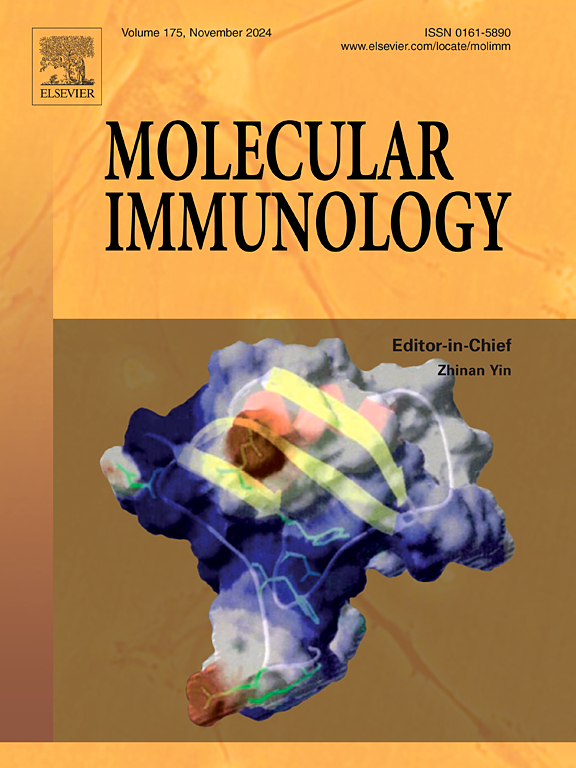Gut microbiota-derived Proline-Leucine dipeptide aggravated sepsis-induced acute lung injury via activating Nod2/NF-κB signaling pathway
IF 3
3区 医学
Q2 BIOCHEMISTRY & MOLECULAR BIOLOGY
引用次数: 0
Abstract
Objective
Gut microbiota-derived metabolites can modulate lung tissue damage via the gut-lung axis. This study aimed to delineate the alterations in gut microbiota and metabolites associated with sepsis and elucidate their role in potentiating lung tissue damage.
Methods
We employed 16S rDNA sequencing and non-targeted metabolomics to assess the changes in gut microbiota and metabolites, utilizing a rat model of sepsis. Furthermore, we investigated the contributions of the gut microbiota-derived Proline-Leucine (Pro-Leu) dipeptide and lipopolysaccharide (LPS) in driving lung inflammation, utilizing both mouse models and MH-S cells.
Results
Our findings indicate that sepsis significantly diminished gut microbiota diversity and markedly increased the relative abundance of Bacteroidetes and Escherichia-Shigella, as well as the metabolite Pro-Leu. Notably, Pro-Leu levels correlated with changes in bacterial communities. Additionally, Pro-Leu effectively exacerbated sepsis-induced lung damage. Both Pro-Leu and LPS notably enhanced pro-inflammatory cytokine production (TNF-α, IL-6, and IL-1β) by up-regulating C/EBP-β, p-NF-κB, and NOD2 in lung tissues and MH-S cells.
Conclusions
Our findings suggest that Pro-Leu and LPS can synergistically intensify lung inflammation by activating the C/EBP-β/NOD2/NF-κB signaling pathways.
Importance
Our findings indicate that sepsis can lead to a disruption of the gut microbiota, an increase in pathogenic bacteria such as Escherichia-Shigella and Bacteroides, and that metabolites derived from the gut microbiota can modulate the lung inflammatory response through the gut-lung axis. Notably, Pro-Leu, a metabolite produced by the gut microbiota, was found to aggravate sepsis-induced ALI by activating the C/EBP-β/NOD2/NF-κB signaling pathways.
肠道微生物源性脯氨酸-亮氨酸二肽通过激活Nod2/NF-κB信号通路加重败血症诱导的急性肺损伤
目的肠道微生物衍生代谢物可通过肠-肺轴调节肺组织损伤。本研究旨在描述与败血症相关的肠道微生物群和代谢物的改变,并阐明它们在增强肺组织损伤中的作用。方法利用大鼠脓毒症模型,采用16S rDNA测序和非靶向代谢组学方法评估肠道菌群和代谢物的变化。此外,我们利用小鼠模型和MH-S细胞研究了肠道微生物来源的脯氨酸-亮氨酸(Pro-Leu)二肽和脂多糖(LPS)在驱动肺部炎症中的作用。结果脓毒症显著降低了肠道菌群多样性,显著增加了拟杆菌门、志贺氏埃希菌及其代谢产物Pro-Leu的相对丰度。值得注意的是,Pro-Leu水平与细菌群落的变化相关。此外,Pro-Leu有效加重败血症引起的肺损伤。Pro-Leu和LPS均通过上调肺组织和MH-S细胞的C/EBP-β、p-NF-κB和NOD2,显著提高促炎细胞因子(TNF-α、IL-6和IL-1β)的产生。结论Pro-Leu和LPS通过激活C/EBP-β/NOD2/NF-κB信号通路,协同增强肺部炎症反应。我们的研究结果表明,败血症可导致肠道微生物群的破坏,致病菌如埃希氏志贺氏菌和拟杆菌的增加,并且来自肠道微生物群的代谢物可以通过肠-肺轴调节肺部炎症反应。值得注意的是,肠道菌群产生的代谢物Pro-Leu通过激活C/EBP-β/NOD2/NF-κB信号通路,加重败血症诱导的ALI。
本文章由计算机程序翻译,如有差异,请以英文原文为准。
求助全文
约1分钟内获得全文
求助全文
来源期刊

Molecular immunology
医学-免疫学
CiteScore
6.90
自引率
2.80%
发文量
324
审稿时长
50 days
期刊介绍:
Molecular Immunology publishes original articles, reviews and commentaries on all areas of immunology, with a particular focus on description of cellular, biochemical or genetic mechanisms underlying immunological phenomena. Studies on all model organisms, from invertebrates to humans, are suitable. Examples include, but are not restricted to:
Infection, autoimmunity, transplantation, immunodeficiencies, inflammation and tumor immunology
Mechanisms of induction, regulation and termination of innate and adaptive immunity
Intercellular communication, cooperation and regulation
Intracellular mechanisms of immunity (endocytosis, protein trafficking, pathogen recognition, antigen presentation, etc)
Mechanisms of action of the cells and molecules of the immune system
Structural analysis
Development of the immune system
Comparative immunology and evolution of the immune system
"Omics" studies and bioinformatics
Vaccines, biotechnology and therapeutic manipulation of the immune system (therapeutic antibodies, cytokines, cellular therapies, etc)
Technical developments.
 求助内容:
求助内容: 应助结果提醒方式:
应助结果提醒方式:


